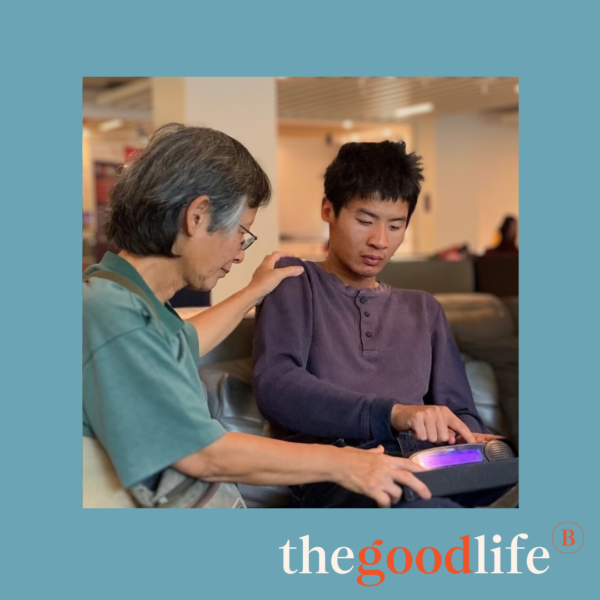The Good Life: Tim
Growing up
I am the youngest of four children. In the first weeks of my life, my mother says, everything was going well. But then it became clear that I would not settle or sleep easily. My milestones were also delayed, not sitting up until I was eight months old. I never crawled, but stood up at around fourteen months, and walked two months later.
My communication was also a little late, with babbling at 12 months, then single words not long after. Unlike my siblings whose first word was ‘ma’ (mother in Chinese), my first word was ‘dang’ – light – which I spent much time looking at. By 14 months, however, the single words disappeared, although there was nothing wrong with my hearing: I would start to cry whenever my older sister practised the violin.
As the months rolled on, my developmental delays became more obvious, and by two and a half years of age my mother, a psychologist, could no longer deny my difficulties. She booked an appointment with a multidisciplinary team for an assessment and three weeks later she was told I had Autistic Disorder, with severe delays in cognition, social understanding and communication.
From a toddler with no speech and huge developmental delays in all areas, I am proud to have mastered language between the ages of five and seven years via an individualised program designed by my mother. I went on to acquire communication at nine via the Alternative and Augmentative Communication (AAC) method of Facilitated Communication, which involves assisted typing.
With continued improvement in assisted typing, a whole new world opened up for me, and despite many hurdles and exclusionary barriers, I have been able to attend and complete mainstream schooling, make friends, join advocacy groups, present at forums, give a TED talk, go to university, graduate with a Bachelor of Arts (Honours) in Sociology and currently to undertake a PhD program.
Family
My mother has played a pivotal role in translating the world to me, and translating me to the world. Mum has devoted her time and commitment to support me. She does everything. She is the chef, the washer-upper, the cleaning department, my personal wardrobe coordinator, as well as my social secretary and personal assistant. She is my teacher, my therapist and my advocate. She is the tinker, the tailor, the baker and the gluten-free bread maker. She is my chaperone and chauffeur. She also drives me up the wall with her insistence that I do things her way, some of the time. Her unconditional love for me knows no bounds. I would not have aspired as high, attempted as much nor gone as far, without her guidance and unwavering support.
Community
Community provides a sense of belonging and support, which are invaluable to autistic non-speakers with additional communication and high support needs like myself. My community is my tribe, comprising my social network, family, friends and allies.
I am proud to be able to connect socially with a variety of people, some of whom have become my mentors, such as Autistic advocate, psychologist and author, Dr Wenn Lawson, and my BA (Honours) supervisor, Associate Professor Mark Chou. I am proud to be involved in a number of advocacy organisations, such as Reframing Autism and the I CAN Network in their work to level the playing field for the Autistic community.
I’m also privileged to mentor and advocate for several young Autistic non-speakers, and to know that my efforts have made a difference. For instance, one of my mentees, 15-year-old Patrick Saunders, once told me that I am the only person who understands him better than most because we both have complex communication needs (CCN). Patrick has made his mark as a notable non-speaking advocate, with an outstanding presentation to the SA Parliament recently, which has been viewed by 2 million to date.
Advice for a Good Life
For me, a good life is to live fully – to build social connections and make a difference.
On my journey to become a non-speaking Autistic advocate, I have met many challenges and worked hard to manage and overcome these. I now feel the need to devote time to help others in the same boat. Helping other non-speaking Autistics has also led me to develop and grow in many ways, in becoming the person I aspire to be, to be more skilled, compassionate and resilient.
My advice to young Autistic people is this: don’t be deterred by neurotypical, deficit-based views of Autism – that Autism is a disorder. Live fully, as your Autistic differences provide valuable perspectives and can be assets. Always strive to show others what we are capable of, with our strengths and resilience in meeting life’s curve balls.
To parents of Autistic children, I say: believe in your children, be aware of their differences and refrain from aligning with non-autistic values, often unconscious, in parenting. Don’t be afraid to take the road less travelled, in letting your kids pave the way to become self-advocates to meet their own support needs, with your support and guidance.
Tim Chan is a proud Autistic non-speaking advocate and student. He holds a Bachelor of Arts (Honours) in Sociology and is currently undertaking a PhD on the neurodiversity movement and its applicability to Autistic individuals with complex communication needs. Tim is a board member of Reframing Autism and an ambassador for Communication Rights Australia and the I CAN Network.
Some of the insights that Tim has shared are taken from his book with his mother, Sarah Chan, Back from the Brink: Stories of Resilience, Reconcilation and Reconnection.
In our social media series #StoriesOfTheGoodLife we explore what a good life means for people with disability. People from all walks of life, living rich, full and meaningful lives on their own terms.
Funded by the Australian Government Department of Social Services
